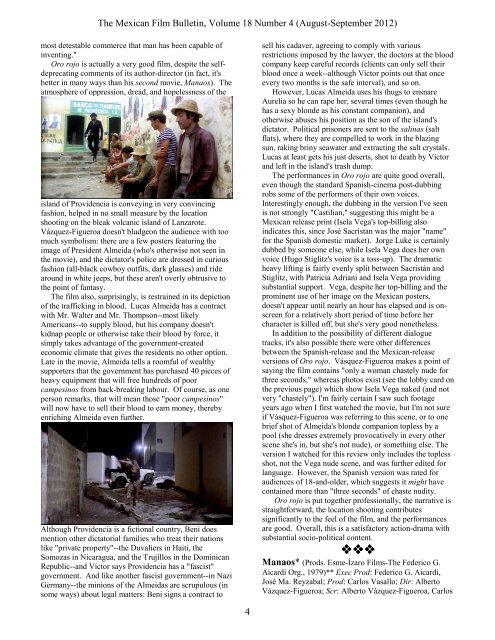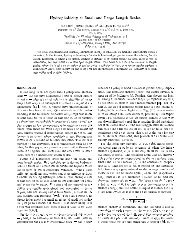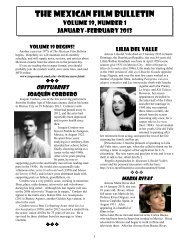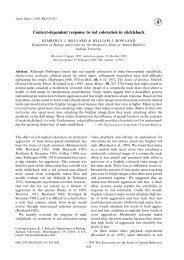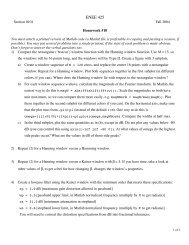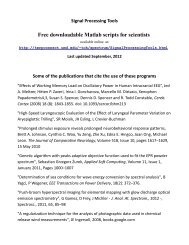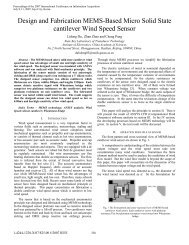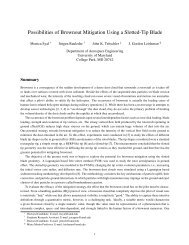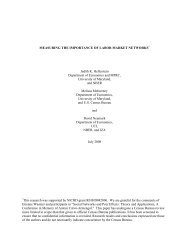Bonus Jorge Luke Film Review - TerpConnect
Bonus Jorge Luke Film Review - TerpConnect
Bonus Jorge Luke Film Review - TerpConnect
Create successful ePaper yourself
Turn your PDF publications into a flip-book with our unique Google optimized e-Paper software.
The Mexican <strong>Film</strong> Bulletin, Volume 18 Number 4 (August-September 2012)<br />
most detestable commerce that man has been capable of<br />
inventing."<br />
Oro rojo is actually a very good film, despite the selfdeprecating<br />
comments of its author-director (in fact, it's<br />
better in many ways than his second movie, Manaos). The<br />
atmosphere of oppression, dread, and hopelessness of the<br />
island of Providencia is conveying in very convincing<br />
fashion, helped in no small measure by the location<br />
shooting on the bleak volcanic island of Lanzarote.<br />
Vázquez-Figueroa doesn't bludgeon the audience with too<br />
much symbolism: there are a few posters featuring the<br />
image of President Almeida (who's otherwise not seen in<br />
the movie), and the dictator's police are dressed in curious<br />
fashion (all-black cowboy outfits, dark glasses) and ride<br />
around in white jeeps, but these aren't overly obtrusive to<br />
the point of fantasy.<br />
The film also, surprisingly, is restrained in its depiction<br />
of the trafficking in blood. Lucas Almeida has a contract<br />
with Mr. Walter and Mr. Thompson--most likely<br />
Americans--to supply blood, but his company doesn't<br />
kidnap people or otherwise take their blood by force, it<br />
simply takes advantage of the government-created<br />
economic climate that gives the residents no other option.<br />
Late in the movie, Almeida tells a roomful of wealthy<br />
supporters that the government has purchased 40 pieces of<br />
heavy equipment that will free hundreds of poor<br />
campesinos from back-breaking labour. Of course, as one<br />
person remarks, that will mean those "poor campesinos"<br />
will now have to sell their blood to earn money, thereby<br />
enriching Almeida even further.<br />
Although Providencia is a fictional country, Beni does<br />
mention other dictatorial families who treat their nations<br />
like "private property"--the Duvaliers in Haiti, the<br />
Somozas in Nicaragua, and the Trujillos in the Dominican<br />
Republic--and Víctor says Providencia has a "fascist"<br />
government. And like another fascist government--in Nazi<br />
Germany--the minions of the Almeidas are scrupulous (in<br />
some ways) about legal matters: Beni signs a contract to<br />
4<br />
sell his cadaver, agreeing to comply with various<br />
restrictions imposed by the lawyer, the doctors at the blood<br />
company keep careful records (clients can only sell their<br />
blood once a week--although Víctor points out that once<br />
every two months is the safe interval), and so on.<br />
However, Lucas Almeida uses his thugs to ensnare<br />
Aurelia so he can rape her, several times (even though he<br />
has a sexy blonde as his constant companion), and<br />
otherwise abuses his position as the son of the island's<br />
dictator. Political prisoners are sent to the salinas (salt<br />
flats), where they are compelled to work in the blazing<br />
sun, raking briny seawater and extracting the salt crystals.<br />
Lucas at least gets his just deserts, shot to death by Víctor<br />
and left in the island's trash dump.<br />
The performances in Oro rojo are quite good overall,<br />
even though the standard Spanish-cinema post-dubbing<br />
robs some of the performers of their own voices.<br />
Interestingly enough, the dubbing in the version I've seen<br />
is not strongly "Castilian," suggesting this might be a<br />
Mexican release print (Isela Vega's top-billing also<br />
indicates this, since José Sacristan was the major "name"<br />
for the Spanish domestic market). <strong>Jorge</strong> <strong>Luke</strong> is certainly<br />
dubbed by someone else, while Isela Vega does her own<br />
voice (Hugo Stiglitz's voice is a toss-up). The dramatic<br />
heavy lifting is fairly evenly split between Sacristán and<br />
Stiglitz, with Patricia Adriani and Isela Vega providing<br />
substantial support. Vega, despite her top-billing and the<br />
prominent use of her image on the Mexican posters,<br />
doesn't appear until nearly an hour has elapsed and is onscreen<br />
for a relatively short period of time before her<br />
character is killed off, but she's very good nonetheless.<br />
In addition to the possibility of different dialogue<br />
tracks, it's also possible there were other differences<br />
between the Spanish-release and the Mexican-release<br />
versions of Oro rojo. Vásquez-Figueroa makes a point of<br />
saying the film contains "only a woman chastely nude for<br />
three seconds," whereas photos exist (see the lobby card on<br />
the previous page) which show Isela Vega naked (and not<br />
very "chastely"). I'm fairly certain I saw such footage<br />
years ago when I first watched the movie, but I'm not sure<br />
if Vásquez-Figueroa was referring to this scene, or to one<br />
brief shot of Almeida's blonde companion topless by a<br />
pool (she dresses extremely provocatively in every other<br />
scene she's in, but she's not nude), or something else. The<br />
version I watched for this review only includes the topless<br />
shot, not the Vega nude scene, and was further edited for<br />
language. However, the Spanish version was rated for<br />
audiences of 18-and-older, which suggests it might have<br />
contained more than "three seconds" of chaste nudity.<br />
Oro rojo is put together professionally, the narrative is<br />
straightforward, the location shooting contributes<br />
significantly to the feel of the film, and the performances<br />
are good. Overall, this is a satisfactory action-drama with<br />
substantial socio-political content.<br />
��� ��� ��� ���<br />
Manaos* (Prods. Esme-Ízaro <strong>Film</strong>s-The Federico G.<br />
Aicardi Org., 1979)** Exec Prod: Federico G. Aicardi,<br />
José Ma. Reyzabal; Prod: Carlos Vasallo; Dir: Alberto<br />
Vázquez-Figueroa; Scr: Alberto Vázquez-Figueroa, Carlos


